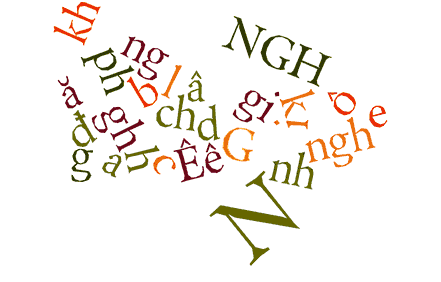Learn Vietnamese
| English | Vietnamese | |||
|---|---|---|---|---|
| Hello | Chào Anh | |||
| Hello | Chào Em | |||
| Good evening | Chào Anh | |||
| Good evening | Chào Em | |||
| Goodbye | Tạm biệt | |||
| Goodbye | Chào | |||
| See you later | Gặp lại sau | |||
| Yes | Có | |||
| No | Không | |||
| Please! | Anh ơi ! | |||
| Please! | Em ơi ! | |||
| Thanks | Cám ơn | |||
| Thanks a lot | Cám ơn nhiều | |||
| Thank you for your help | Cám ơn | |||
| Thank you for your help | Cám ơn vì đã giúp đỡ | |||
| Don't mention it | Không có gì | |||
| Ok | Đồng ý | |||
| How much is it? | Bao nhiêu tiền? | |||
| Sorry! | Xin lỗi | |||
| I don't understand | Tôi không hiểu | |||
| I get it | Tôi hiểu rồi | |||
| I don't know | Tôi không biết | |||
| Forbidden | Bị cấm | |||
| Excuse me, where are the toilets? | Xin lỗi, nhà vệ sinh ở đâu? | |||
| Happy New Year! | Chúc mừng năm mới ! | |||
| Happy birthday! | Chúc mừng sinh nhật ! | |||
| Happy holiday! | Nghỉ lễ vui vẻ ! | |||
| Congratulations! | Chúc mừng ! |
How to Learn Vietnamese - A Complete Guide
We have adopted an objective and efficient approach to learn how to speak a language easily and quickly.
We suggest you start by memorizing words, phrases, and practical expressions that you can use in everyday life and that will be useful when traveling.
Getting used to pronouncing words out loud, such as numbers, is an easy exercise you can often practice and at any time throughout the day.
This practice will help you get accustomed to the sounds of your chosen language, making it more familiar.
Once your holidays have begun in Vietnam, you will be surprised at how familiar and easy to understand it will seem.
Furthermore, using a pocket dictionary is always useful, particularly during a trip. It allows you to find the translation of new words and enrich your vocabulary.
Our Approach to Learning Vietnamese: Northern vs. Southern Variations
In this method, we primarily focus on the Northern Vietnamese dialect while occasionally providing insights into Southern Vietnamese pronunciation. The southern accent features one fewer tone and distinct phonetic differences, which can pose challenges in a tonal language. Despite having identical vocabulary, certain words that seem harmless in the north can turn into serious insults in the south if mispronounced! We provide an example of this in our Vietnamese conversation guide.
Is Vietnamese Easy to Learn?
Vietnamese is relatively easy to learn compared to many other languages because its grammar is straightforward—there are no conjugations, declensions, irregular plurals, or other complex rules that typically challenge language learners. However, Vietnamese pronunciation can be tricky at first due to its six distinctive tones, which dramatically change the meaning of words. Mastering correct pronunciation is essential to being understood by native speakers.
Why Learn Vietnamese?
Vietnamese is the official language of Vietnam, spoken by over 90 million people. If you're planning to visit Ho Chi Minh City, Hanoi, or any other part of the country, learning Vietnamese will enrich your experience. Mastering the basics will help you engage with Vietnamese people, explore local culture, and improve your speaking skills.
How to Start Learning Vietnamese
1. Build a Strong Foundation
Start with basic Vietnamese words and phrases. Apps like Loecsen or Duolingo and resources such as Vietnamese with Annie can help you practice pronunciation and expand your vocabulary.
2. Focus on Pronunciation and Vocabulary
The Vietnamese language has six distinct tones, which are crucial for understanding meaning. Practice common Vietnamese phrases, vowels, and grammar rules to improve your fluency.
3. Engage with Native Speakers
To enhance your conversation skills, try speaking with Vietnamese native speakers. You can find online tutors or join language exchange programs to immerse yourself in real conversations.
4. Use Structured Lessons
Join Vietnamese classes or online courses. A structured approach will help you grasp essential grammar rules and improve your proficiency in the Vietnamese language.
Key Aspects of the Vietnamese Language
- Learn common Vietnamese words and phrases.
- Understand the differences between Southern Vietnamese and Northern accents.
- Improve your pronunciation with listening exercises.
- Master essential grammar rules for clear communication.
- Practice Vietnamese online through language apps and tutors.
Resources to Improve Your Vietnamese
- Vietnamese lessons on YouTube and online platforms.
- Language exchange programs with native Vietnamese speakers.
- Books and study guides for in-depth learning.
- Apps like Vietnamese with Annie for structured learning.
- Podcasts and subtitles for listening practice.
The Importance of Social Position in Vietnamese Grammar
Learning to situate oneself socially in relation to your interlocutor is essential for expressing yourself correctly in Vietnamese. Depending on the gender, age, relationship, level of familiarity, and parental lineage, you will have to employ a different turn of phrase. To express yourself well is also to master a knowledge of manners, to which the Vietnamese are very sensitive.
However, do not be too alarmed because it is accepted that a foreigner may not be able to master all these subtleties. So you should not get too stuck in your learning at the start - but it is certain that your true integration will only begin when you know how to use the determinants correctly.
In addition, the modernization of Vietnamese society has accompanied a certain relaxation of these rules, which used to be codified in a very strict way: do not rely too much on old textbooks on this subject, nor on foreigners who learned the language a long time ago and have not kept their language learning up to date, and try to persuade you that they know the authentic turns of phrase.
Once you have overcome this barrier, you will find that the grammar of this language is simple, especially because all the words are invariable (there are no masculine or feminine words, for example).
The formulations used in this table are extracted from the most frequent cases. Most expressions use the determinants "Anh" and "Em". If the person you are speaking with changes, simply replace the determinant proposed in our conversation guide by one appropriate to the situation by referring to the table below.
The bottom of the boxes allows you to determine the gender of the speaker and the interlocutor: grey for the female, white for male. Finally, it is interesting to know that these determinants are all derived from the vocabulary of the family (little brother, big sister, grandmother, etc.), which demonstrates how Vietnamese society is centered around the notion of a group.
| Situation | Gender of Locutor | Gender of Interlocutor | ||
|---|---|---|---|---|
| 1. Speaking with someone older than you | F | M | Em | Anh |
| F | F | Em | Chị | |
| M | M | Em | Anh | |
| M | F | Em | Chị | |
| 2. Speaking with someone younger than you | F | M | Chị | Em |
| F | F | Chị | Em | |
| M | M | Anh | Em | |
| M | F | Anh | Em | |
| 3. Speaking with an elderly person (woman or man) | F | M | Cháu (North) - Con (South) | Ông |
| F | F | Cháu (North) - Con (South) | Bà | |
| M | M | Cháu (North) - Con (South) | Ông | |
| M | F | Cháu (North) - Con (South) | Bà | |
| 4. Speaking with a friend of the same age | F | M | Tôi | Bạn |
| F | F | Tôi | Bạn | |
| M | M | Tôi | Bạn | |
| M | F | Tôi | Bạn |
The Vietnamese Alphabet
The current alphabet is based on a transcription of the language in Latin characters in the 16th century by missionaries from Portugal. It was preserved after decolonization and became the official administrative writing in 1954. This may seem surprising from a people who over the years have always shown a fierce desire for independence, but it reveals an authentic sense of pragmatism and a great openness of spirit. Importantly, this alphabet has facilitated the unification of different ethnic groups.
The alphabet is enriched with many diacritics used to specify the phonetic value of certain letters as well as their tone.
It must be remembered that the pronunciation in the north and south of the country is very different, and several letters will have very different pronunciations.
This language is tonal, which means that the meaning of a word can change depending on how the syllables are pronounced. It is therefore impossible to speak this language orally without audio support.
Six different tones are used: neutral tone, rising tone, slowly descending tone, abruptly descending tone, a tone which descends then rises, and a tone which rises in two levels.
It is difficult to say more about it here because ultimately, at the same time as learning a word, you have to learn the tone that goes with it. The good news in all this is that this language is monosyllabic (each word is composed of a single syllable), and each word will correspond to only one tone (think of English where the stress can be at the beginning, middle or end of a word!).
Start Your Vietnamese Learning Journey Today
Whether you're traveling to Vietnam, improving your language skills, or connecting with Vietnamese people, learning the Vietnamese language is an exciting and rewarding process. Join our course, practice daily, and immerse yourself in the culture!





